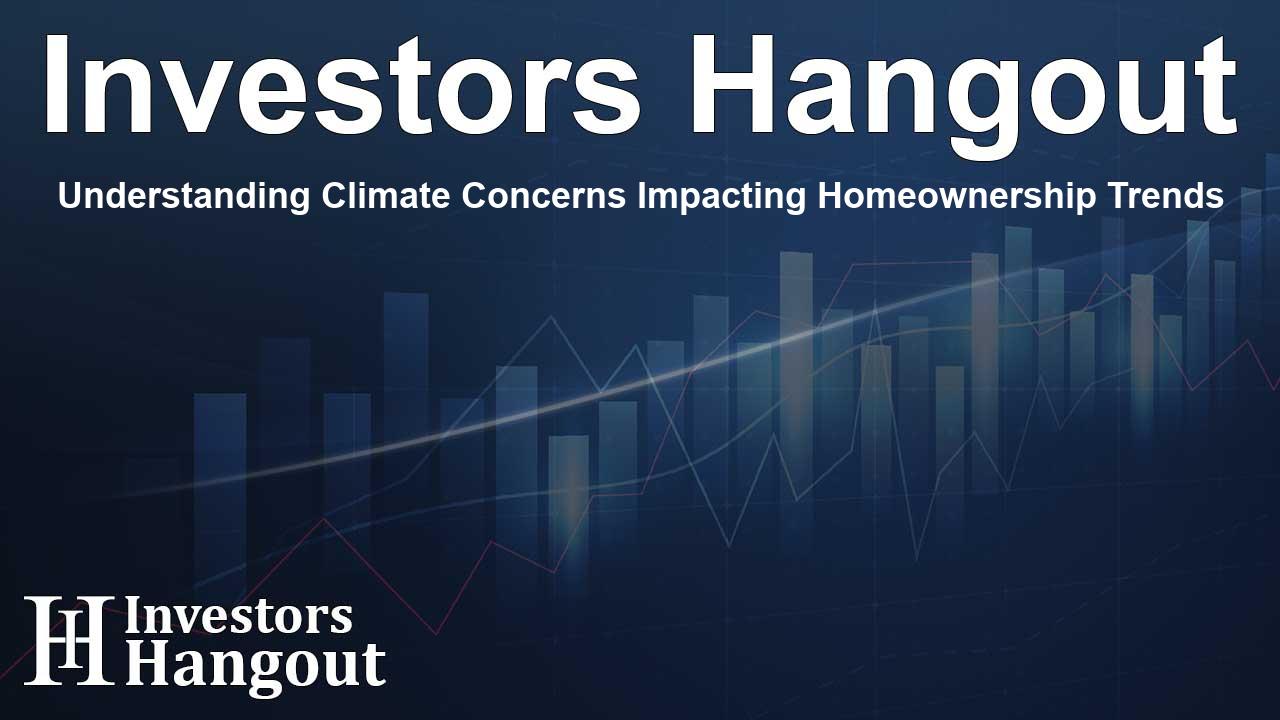Understanding Climate Concerns Impacting Homeownership Trends

Growing Concerns Over Climate Change and Homeownership
Recent insights reveal that a significant number of Americans are concerned about the implications of climate change on homeownership. Nearly two-thirds, about 65%, express fears over the increasing frequency and severity of natural disasters affecting their homes. Alarmingly, only a small fraction, just 7%, feels their properties are fully prepared to withstand such disasters.
Shifting Perspectives on Homeownership Risks
In a recent study, approximately 68% of respondents indicated that they consider buying a home to be riskier today than it was a decade ago. This shift in perception is largely driven by concerns related to climate change and the impact of natural disasters. Homeownership has traditionally been seen as a stable investment, but these worries are altering that narrative.
Homebuyers Taking Disasters into Account
Among homeowners, nearly 69% report that they factored in disaster risks when selecting their properties. This cautious approach is significant, especially since nearly half of non-homeowners (46%) are reconsidering their future home-buying prospects due to such climate concerns. This reflects a broader trend towards a more cautious and informed approach to home ownership in the face of climate threats.
Fears of Relocation and Property Safety
Furthermore, a substantial percentage of homeowners, about 61%, are apprehensive that a natural disaster could potentially destroy their homes. Almost half, specifically 48%, are concerned they might need to relocate eventually due to climate-related risks. These fears highlight the anxiety surrounding future real estate stability.
Confidence Levels Among Homeowners
Interestingly, only about 26% of homeowners feel secure that their properties are safe from future climate threats. Furthermore, roughly 11% openly admit to lacking confidence in their understanding of local climate risks. This lack of awareness can lead to poor decision-making and greater losses in the long run.
Non-homeowners Taking Action
Climate concerns are leading about 35% of non-homeowners to eliminate certain locations from their potential home search due to perceived disaster risks. Notably, states like California, Florida, and Texas are viewed as high-risk due to natural disasters such as tornadoes, wildfires, and hurricanes.
Willingness to Invest in Safety
Troublingly, while many acknowledge the risks, 74% of Americans would be willing to pay more for homes that offer protection against local climate threats. Additionally, about 63% would pay a premium to reside in low-risk areas. These statistics suggest that buyers are becoming more willing to invest in safety measures.
High-risk Properties and Homebuying Decisions
As consumer expectations evolve, one in three Americans indicates a readiness to consider purchasing homes in high-risk areas, indicating that there could be trade-offs considered. Particularly, 48% would be persuaded by significant discounts when considering homes in these environments, showing a complicated relationship with risk-reward scenarios.
Public Perception of Risk and Accountability
There's a prevailing sentiment in the marketplace where nearly half of Americans believe that homebuyers who choose properties in high-risk areas deserve the financial repercussions associated with those decisions. Additionally, approximately 39% argue that no discount can justify living in an area prone to disasters.
Future Expectations on Climate-Safe Areas
Looking ahead, 30% of Americans foresee a shortage of 'climate-safe' living environments within the next 10 years. This projection could significantly affect future housing markets and location desirability, shifting the focus to resilience against climate change.
Conclusion
The discourse around climate change and its effect on homeownership is vital in today’s real estate landscape. As homeowners and potential buyers navigate these evolving conditions, a clear understanding of risks and preparedness will become increasingly essential. The future may require a re-evaluation of strategies and considerations for living sustainably and safely.
Frequently Asked Questions
What percentage of Americans believe climate change affects home buying decisions?
Approximately 68% of Americans feel that homeownership is riskier than it was ten years ago due to climate change.
How many homeowners consider disaster risks when buying a home?
About 69% of homeowners take disaster risks into account during their home buying process.
What are the main concerns related to climate change and housing?
Homeowners fear for their property safety, potential relocation, and that natural disasters could lead to significant damage to their homes.
Are buyers willing to pay more for climate-safe properties?
Yes, 74% of Americans would pay a premium for homes that are protected from local climate threats.
What do non-homeowners report regarding climate concerns?
About 35% of non-homeowners have ruled out certain areas for living due to perceived climate or disaster risks.
About The Author
Contact Dominic Sanders privately here. Or send an email with ATTN: Dominic Sanders as the subject to contact@investorshangout.com.
About Investors Hangout
Investors Hangout is a leading online stock forum for financial discussion and learning, offering a wide range of free tools and resources. It draws in traders of all levels, who exchange market knowledge, investigate trading tactics, and keep an eye on industry developments in real time. Featuring financial articles, stock message boards, quotes, charts, company profiles, and live news updates. Through cooperative learning and a wealth of informational resources, it helps users from novices creating their first portfolios to experts honing their techniques. Join Investors Hangout today: https://investorshangout.com/
The content of this article is based on factual, publicly available information and does not represent legal, financial, or investment advice. Investors Hangout does not offer financial advice, and the author is not a licensed financial advisor. Consult a qualified advisor before making any financial or investment decisions based on this article. This article should not be considered advice to purchase, sell, or hold any securities or other investments. If any of the material provided here is inaccurate, please contact us for corrections.
